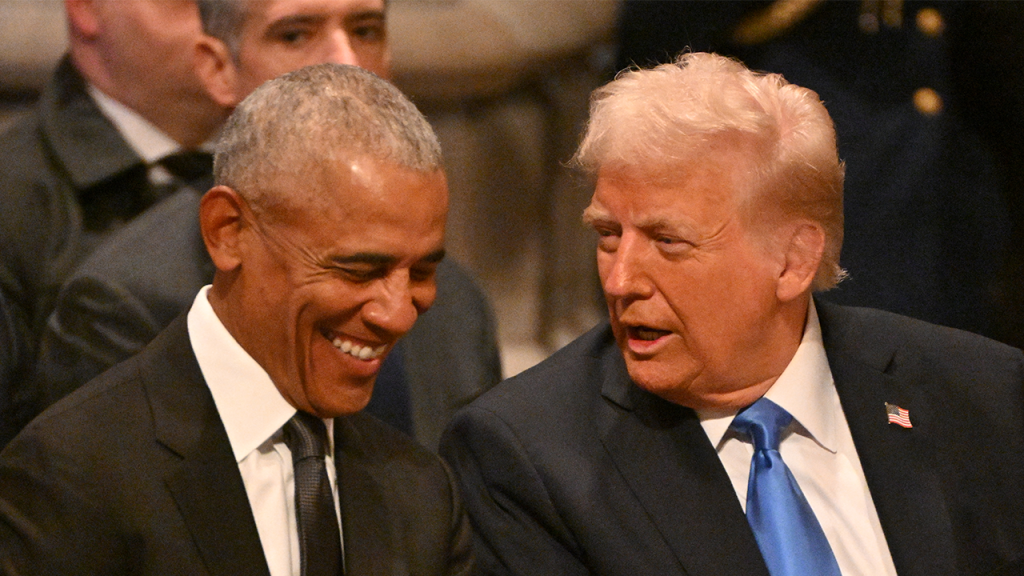In recent comments, President Donald Trump expressed enthusiasm about the possibility of running against former President Barack Obama in a hypothetical third-term election. This remark came during an interview where Trump was asked if he would enjoy such a matchup, to which he responded positively. Trump’s interest in a potential third term comes as he continues to navigate his current presidency and reassess his political ambitions amidst ongoing discussions about constitutional limits on presidential terms.
| Article Subheadings |
|---|
| 1) Trump’s remarks on a potential third term |
| 2) The 22nd Amendment: A barrier to a third term |
| 3) Legal considerations for a third presidential run |
| 4) Historical context: FDR’s four-term presidency |
| 5) Public reaction and implications of Trump’s candidacy |
Trump’s remarks on a potential third term
During an interview conducted in the Oval Office, President Donald Trump was queried by a reporter regarding the possibility of facing former President Barack Obama should he choose to run for a third term. Trump responded affirmatively, stating, “I’d love that. That would be a good one.” This interaction highlighted Trump’s ongoing speculation about whether he might pursue another bid for presidency despite the challenges and complexities such a move would entail. He referenced public support and the notion that potential avenues for a third term exist, stating, “I don’t know about that,” but acknowledging the rumors surrounding his potential candidacy.
The 22nd Amendment: A barrier to a third term
The 22nd Amendment to the United States Constitution serves as a critical legal obstacle for any president seeking a third term. Ratified in 1951, following the unprecedented four-term presidency of Franklin D. Roosevelt, this amendment explicitly limits individuals to serve two terms in office. Roosevelt’s tenure lasted through the tumultuous periods of the Great Depression and World War II, making his extended presidency a topic of major historical significance. The 22nd Amendment was thus a response to prevent future presidents from accumulating such an enduring hold on power.
Legal considerations for a third presidential run
In the interview, Trump did not delve into the specific legal mechanisms that would allow him to opt for a third term, which currently seems unfeasible under the existing constitutional framework. He mentioned that “there are methods which you could do it,” referring potentially to strategies like having the Vice President run and then transferring power. This speculation raises questions about the interpretations and legal challenges that could arise if such hypothetical scenarios were pursued. Constitutional experts weigh in on Trump’s comments, suggesting that any attempts to bypass the limitations set by the 22nd Amendment would likely encounter significant legal challenges and opposition both in court and politically.
Historical context: FDR’s four-term presidency
The reluctance to allow a president to serve more than two terms stems from historical precedents established by Roosevelt’s lengthy presidency. Serving from 1933 until his death in 1945, Roosevelt was elected to four terms, which transformed the political landscape in the United States. The context of his presidency was marked by extraordinary national and international crises, such as the Great Depression and World War II, which contributed to a public sentiment that perhaps a steady leadership should continue indefinitely. However, critics of long-standing presidencies argue that such situations could lead to the erosion of democratic norms and concentration of power in a single individual. Thus, the 22nd Amendment was implemented to uphold the principles of democratic governance.
Public reaction and implications of Trump’s candidacy
Trump’s remarks about potentially running against Obama have elicited a range of responses from both supporters and opponents. Many of his supporters view Trump’s potential candidacy as a continuation of his political influence, reflecting a sense of loyalty and enthusiasm for his presidency. On the other hand, skepticism exists among detractors who perceive these speculations as distractions from existing political issues and a deliberate evasion of constitutional constraints. The implications of Trump’s candidacy extend beyond party lines, influencing public discourse about adaptability within the political system and democratic principles. Political analysts highlight that should Trump seriously pursue a third-term bid or challenge the statutes in place, it could ignite significant debates about electoral integrity and constitutional safeguards.
| No. | Key Points |
|---|---|
| 1 | President Trump expressed interest in a hypothetical third-term run against Obama. |
| 2 | The 22nd Amendment limits presidents to two terms, creating legal boundaries. |
| 3 | Trump mentioned there are methods to potentially bypass the limitations of the 22nd Amendment. |
| 4 | FDR’s four-term presidency triggered the need for constitutional amendments. |
| 5 | Public reaction varies, reflecting divisions in electoral support and opposition. |
Summary
In conclusion, President Donald Trump‘s recent comments about a potential third-term candidacy highlight a complex interplay of legal, historical, and political factors at play. The constraints imposed by the 22nd Amendment, shaped by the legacy of Franklin D. Roosevelt, remain crucial in discussions regarding U.S. presidential elections. As the nation continues to grapple with the implications of Trump’s ongoing political aspirations, it becomes evident that the path to a third term is fraught with challenges that extend well beyond personal ambition.
Frequently Asked Questions
Question: What did Trump say about running for a third term?
Trump expressed enthusiasm about the idea of running against Obama, mentioning that he would “love that” even though it currently remains a hypothetical situation.
Question: Why is the 22nd Amendment significant?
The 22nd Amendment is significant because it restricts any individual from serving more than two terms as president, a safeguard established after Roosevelt’s presidency to prevent the concentration of power in one individual.
Question: What are the implications of Trump’s comments on a potential third term?
Trump’s comments have sparked discussions about the electoral process, legal authority regarding term limits, and public opinion surrounding his presidential legacy, indicating that any move toward a third term would be legally complex and politically charged.


